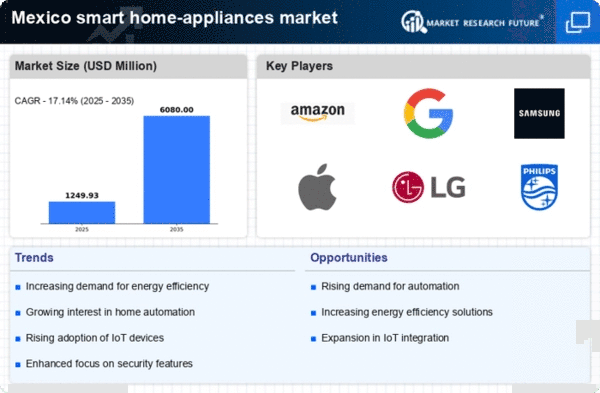Rising Urbanization
The increasing urbanization in Mexico is a pivotal driver for the smart home-appliances market. As more individuals migrate to urban areas, the demand for innovative and efficient home solutions rises. Urban dwellers often seek convenience and enhanced living standards, which smart home appliances can provide. According to recent data, urban areas in Mexico are projected to house over 80% of the population by 2030. This demographic shift is likely to fuel the adoption of smart technologies, as consumers look for ways to optimize their living spaces. The smart home-appliances market is expected to benefit significantly from this trend, as urban residents prioritize modern amenities that align with their fast-paced lifestyles.
Enhanced Security Features
Enhanced security features are becoming a critical driver for the smart home-appliances market. As concerns about home safety increase, consumers are increasingly seeking appliances that offer advanced security functionalities. In Mexico, the demand for smart security systems, such as cameras and alarms, has surged, with a reported growth of 25% in the last year. Homeowners are looking for integrated solutions that provide real-time monitoring and control over their properties. This trend indicates a shift towards smart appliances that not only serve traditional functions but also enhance home security. The smart home-appliances market is likely to benefit from this growing emphasis on safety, as consumers prioritize products that offer peace of mind.
Technological Advancements
Technological advancements play a crucial role in shaping the smart home-appliances market. Innovations in artificial intelligence, machine learning, and the Internet of Things (IoT) are driving the development of smarter, more efficient appliances. In Mexico, the integration of these technologies is becoming increasingly prevalent, with a reported 35% growth in smart device adoption over the past year. Consumers are drawn to appliances that offer enhanced functionality, such as remote control and automation features. The smart home-appliances market is likely to see continued growth as manufacturers invest in research and development to create cutting-edge products that meet the evolving needs of tech-savvy consumers.
Increased Disposable Income
The rise in disposable income among Mexican households is a significant driver for the smart home-appliances market. As economic conditions improve, consumers are more willing to invest in high-quality, technologically advanced appliances. Recent statistics indicate that the average household income in Mexico has increased by approximately 10% over the last five years, leading to greater purchasing power. This trend suggests that more consumers are likely to prioritize smart home technologies, viewing them as valuable investments that enhance comfort and convenience. The smart home-appliances market stands to gain from this shift, as households seek to upgrade their living environments with modern solutions.
Growing Environmental Awareness
Growing environmental awareness among consumers in Mexico is influencing the smart home-appliances market. As individuals become more conscious of their ecological footprint, there is a rising demand for energy-efficient appliances that reduce energy consumption and promote sustainability. Reports indicate that approximately 60% of Mexican consumers are willing to pay a premium for eco-friendly products. This trend is likely to drive the development and adoption of smart appliances that not only offer convenience but also contribute to energy savings. The smart home-appliances market is expected to thrive as manufacturers respond to this demand by creating products that align with consumers' values regarding environmental responsibility.
















Leave a Comment